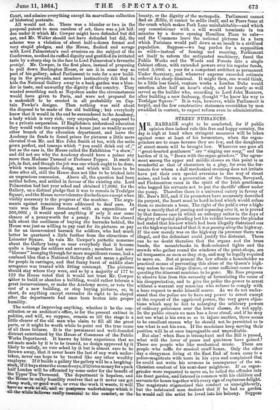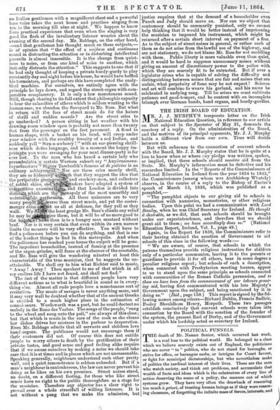STREET NUISANCES..
MR. BABBAGE ought to be comforted, for if public- 111 opinion does indeed rule this free and happy country, the day is nigh at hand when stringent measures will be taken. against some at least of his tormentors, when the organ- grinders are to cease because they are few, and the daughters of street-music will be brought low. Wherever one goes all "great-hearted gentlemen" are "singing one song," and the burden of it is, "Down with the organ-grinders." The agree- ment among the upper and middle classes on this point is as wonderful as that of characters in a play, for even the for- tunate few whom a dull mechanical crooning does not irritate have yet their own special aversions in the way of street noises, and look on a persecution of the German, Savoyard, and Piedmontese races in the spirit of the Irish gentleman who begged his servants not to put the sheriffs' officer under the pump. Therefore there is a universal outcry in favour of Mr.. Bass's Bill, and if its promoters have accurately described its purport, the heart must be hard indeed which would refuse them so moderate a boon. The right of the public over a high- way is merely that of passing and repassing over it, as is proved' by that famous case in which an unhappy suitor in the days of the glory of special pleading lost his verdict because the pleader had stated that his cow which had been illegally distrained was on the highwayinstead of that it was passing along the highway. If the cow merely was on the highway its presence there was illegal, and the defendant could justify the distraint. There can be no doubt therefore that the organs and the brass bands, the mountebanks in flesh-coloured tights and the crowds who gather round the windows of the print-shops, are all trespassers as soon as they stop, and may be legally required to move on. But at present the law affords a householder no practical means of preventing this abuse of the Queen's high- way unless he can allege illness, or some sufficient cause for re- questing the itinerant musician to be gone. Mr. Bass proposes to absolve him from this necessity of. formulating the cause of his disapprobation, and to give the police the power to arrest without a warrant any musician who refuses to comply with. a bare request to make himself scarce. As we do not under- stand that the police are to have any power to arrest except at the request of the aggrieved person, the very grave objec- tions which may be felt to enlarging the arbitrary powers of ordinary policemen over the lower classes, do not apply. In the public streets no man has a locus stancli, and if he may not use what is his own so as to injure another, there seems to be excellent reason why he should not be permitted so to use what is not his own. If the musicians keep moving their position will be at once impregnable and unprofitable. But alas ! when Bass is triumphant and the Bill is passed, what will the lover of peace and quietness have gained ? There are people who like mechanical .music. There are people who raffle for musical snuff-boxes. Only the other day a clergyman living at the East End of town came to a police-magistrate with tears in his eyes and complained that he could not write his sermons in consequence of the us- Christian conduct of his next-door neighbour. If an organ- grinder were requested to move on, he called the offender into his front garden, and listened in common with his children. and servants for hours together with every sign of rapturous delight. The magistrate stigmatized this conduct as unneighbourly, but the infatuated man declared that if he had no garden he would call the artist he. loved into-his balcouy. Suppose an Italian gentleman with a magnificent chest and a powerful bass voice takes the next house and practises singing from ten in the morning till nine at night. We happen to know from practical experience that even when the singing is very good the flesh of the involuntary listener wearies about the evening of the second day. Mr. Babbage, on the other hand, —and that gentleman has thought much on these subjects,— is of opinion that "the effect of a uniform and continuous sound in distracting the attention or in disturbing intellectual pursuits is almost insensible. It is the change from quiet- ness to noise, or from one kind of noise to another, which instantly distracts the attention." This suggests to one that if he had only thought of keeping a private hurdy-gurdy to play constantly day and night before his house, he would have baffled his tormentors, and perhaps ere this have completed the analy- tical machine. For ourselvds, we entirely agree with the principle he lays down, and regard the street-organ with com- parative complacency. It is only a low monotonous sound. Still, though sharing to its full extent that philosophic capacity to bear the calamities of others which is seldom wanting to the human race, we abandon the Savoyard to Mr. Bass. But what in return will the foes of street music do for the haters of shrill and sudden sounds ? Are the street cries to go unchecked ? A person sitting in hot weather with his drawing-room window open is probably not more than twenty feet from the passenger on the foot pavement. A fiend in human shape, with a basket on his head, will creep under your window with the stealthy ferocity of a red Indian, and suddenly yell " Stra-a-awberry ! "with an ear-piercing shrill- ness which defies language, and in a moment the happy urn- promptu you were arranging for your next dinner-party is for ever lost... To the man who has heard a certain lady who perambuletes,:a certain Western suburb cry " AnyOrnamens- fuyarfirestuvOtai—Abr Tamberlik's famous ut de poitrine is an ordinary achieTero - or are these cries merely shrill, they are so bideouslre . th that they suggest the idea that • the peripatetic gi;e0 Irtic Pt;- and crockery-men, and collectors• of rabbit skins, dn• nders have adopted a system of . .c_ettKtitive exaniini441, and that London is divided into distrtckwhich are th- Oaopoly of the most unearthly and ormeie. All these nuisances are to very many peptik orse than street music, and yet the coster- monger class et us all at defiance, for they yell as they walk. We • the least grudge Mr. Bass's clients any relief he may be ive them, but it will be of no more good to the - no e than is to a hungry man mustard without beef. t or is it very certain that even within its own narrow limits the measure will be very effective. You will have to find a policeman before you can do anything, and that is one of the hardest things to find in this metropolis. And, when the policeman has reached your house the culprit will be gone. The impatient householder, instead of fuming at the presence of the organ-grinder, will fume at the absence of the constable, and Mr. Bass will give the wandering minstrel at least this characteristic of the true musician, that he suggests the un- attainable. We shall cry to him what Richter said to music, " Away ! Away ! Thou speakest to me of that which in all my endless life I have not found, and shall not find."
The fact of the matter is that different people have very different notions as to what is beautiful in sound as in every- thing else. Almost all rude people love a monotonous sort of recitative. The music of savages is never anything more, and it may very well be doubted whether that of the ancient Greeks is entitled to a much higher place in the estimation of connoisseurs. Wordsworth was a poet, but he could dectect no melody in the Ranz des Vaehes. The songs of the people, "sung to the wheel and sung unto the pail," are always of this class; but that which is music in the ears of the cook as she cleans her dishes drives her mistress in the parlour to desperation. Even Mr. Babbage admits that all servants and children love hand-organs. The publicans would not encourage them if their customers did not. Of course this does not entitle feOple to worry others to death by the gratification of their private tastes, and good sense and good feeling alike require that if we amuse ourselves by making a noise we should take care that it is at times and in places which are not unreasonable. Speaking generally, neighbours understand each other pretty well, and a quiet remonstrance is seldom unheeded. But if a man's neighbour is cantankerous, the law can never prevent his doing as he likes on his own premises. Street noises stand, no doubt, on a different footing, for those who like street music have no right to the public thoroughfare as a stage for the musician. Therefore any objector has a clear right to prevail over a whole streetfull of willing listeners. It is not without a pang that we make the admission, but justice requires that at the demand of a householder even Punch and Judy should move on. Nor can we object that contumacy should be summarily punished, only we cannot help thinking that it would be better instead of imprisoning the musician to impound his instrument, which might be returned after a certain short interval on payment of a fine. As to the subject of street noises in general, or rather such of them as do not arise from the lawful use of the highway, and are not stationary, we do not blame Mr. Bass for not meddling with them. Public liberty is more valuable even than quiet, and it would be hard to suppress unnecessary noises without giving an amount of discretionary power to the police with which they are scarcely fit to be entrusted. But if ever a legislator arises who is capable of solving the difficulty and distinguishing between noises that are fair and noises that are unfair, what perpetuity of fame may he not expect ! Science and art will combine to weave his garland, and his name be celebrated in undying song. Till lie arises we must cultivate patience and good-temper, and be content with an incomplete triumph over German bands, hand organs, and hurdy-gurdies.





























 Previous page
Previous page